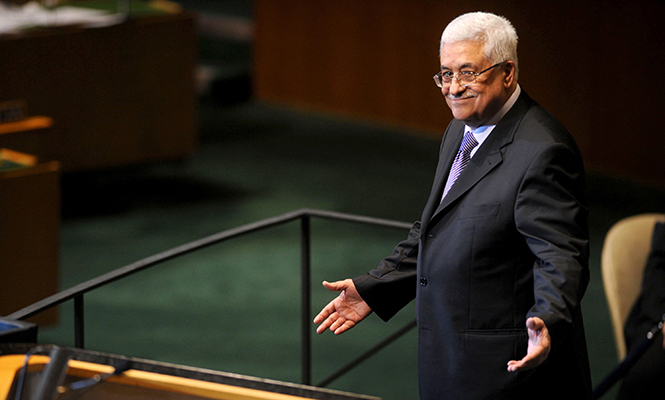Palestinians hope to gain leverage from UN bid
Palestinian Authority President Mahmoud Abbas speaks before the General Assembly at the United Nations in New York City, Friday, September 23, 2011. Photo by Dennis Van Tine/Abaca Press/MCT.
RAMALLAH, West Bank (AP) — The expected U.N. vote today to recognize a state of Palestine will be far more than symbolic — it could give the Palestinians leverage in future border talks with Israel and open the way for possible war crimes charges against the Jewish state.
The Palestinians want the 193-member General Assembly to accept “Palestine,” on the lands Israel occupied in 1967, as a non-member observer state. They anticipate broad support.
For Palestinian President Mahmoud Abbas, the U.N. bid is a last-ditch attempt to stay relevant as a leader after years of failed peace talks with Israel, at a time when his Islamic militant Hamas rivals are gaining ground.
The U.S. and Israel have tried to block the quest for U.N. recognition of Palestine, saying it’s an attempt to bypass Israeli-Palestinian negotiations that broke down four years ago.
The U.S. deputy secretary of state, William Burns, met with Abbas in New York on Wednesday, asking Abbas again to drop the idea and promising that President Barack Obama would re-engage as a mediator in 2013, said Abbas aide Saeb Erekat. Abbas told Burns it was too late.
Israel, meanwhile, appeared to back away from threats of drastic measures if the Palestinians get U.N. approval, with officials suggesting the government would take steps only if the Palestinians use their new status to act against Israel.
The Palestinians say they need U.N. recognition of a Palestinian state in the West Bank, Gaza and east Jerusalem, the lands Israel captured in 1967, to be able to resume negotiations with Israel.
Israeli Prime Minister Benjamin Netanyahu’s predecessors accepted the 1967 lines as a basis for border talks, with modifications to be negotiated, including land swaps that would enable Israel to annex some of the largest Jewish settlements. Those talks did not produce a deal, and the sides remained apart on other key issues.
Netanyahu rejects the 1967 lines as starting point while pressing ahead with settlement construction, leaving Abbas little incentive to resume negotiations. Israel goes to elections in January, and polls indicate Netanyahu has a strong chance of winning.
Israel argues that Abbas is trying to dictate the outcome of border talks by going to the U.N., though the recognition request presented to the world body calls for a quick resumption of negotiations on all core issues of the conflict, including borders.
It’s not clear if negotiations could resume even if Obama, freed from the constraints of his re-election campaign, can turn his attention to the Mideast conflict.
Government spokesman Mark Regev affirmed the position on Wednesday. Regev said that by going to the U.N., the Palestinians violate “both the spirit and the word of signed agreements to solve issues through negotiations.”
Palestinian officials countered that their historic U.N. bid is meant to salvage a peace deal they say is being sabotaged by Israeli settlement expansion. “It is a last-ditch effort because we believe the two-state solution is in jeopardy as a result of these actions,” Hanan Ashrawi, a senior Palestinian official, told reporters in Ramallah on Wednesday.
The Palestinians expect that at least two-thirds of the 193 member states in the General Assembly will support them today, including a number of European countries, among them France, Spain, Norway, Denmark and Switzerland.
Those opposed or abstaining include the U.S., Israel, Germany, Canada, the Netherlands and Australia. Ashrawi urged the U.S. to at least abstain, saying that voting no “would be seen as being really pathetic by the rest of the world” and hurt American interests in the Middle East.
German Chancellor Angela Merkel said Wednesday that “in the long term, this region can only find peace through negotiations to resolve the Middle East conflict,” but she did not say whether her country would abstain or vote against.
“Nothing will really be gained either by unilateral Palestinian initiatives at the United Nations which aim for recognition nor by Israel’s continued building of settlements,” she said.
The vote comes at an important time domestically for Abbas. His Hamas rivals, who control Gaza, have gained popularity after holding their own during an Israeli offensive there earlier this month, aimed at stopping frequent Gaza rocket fire on Israel.



